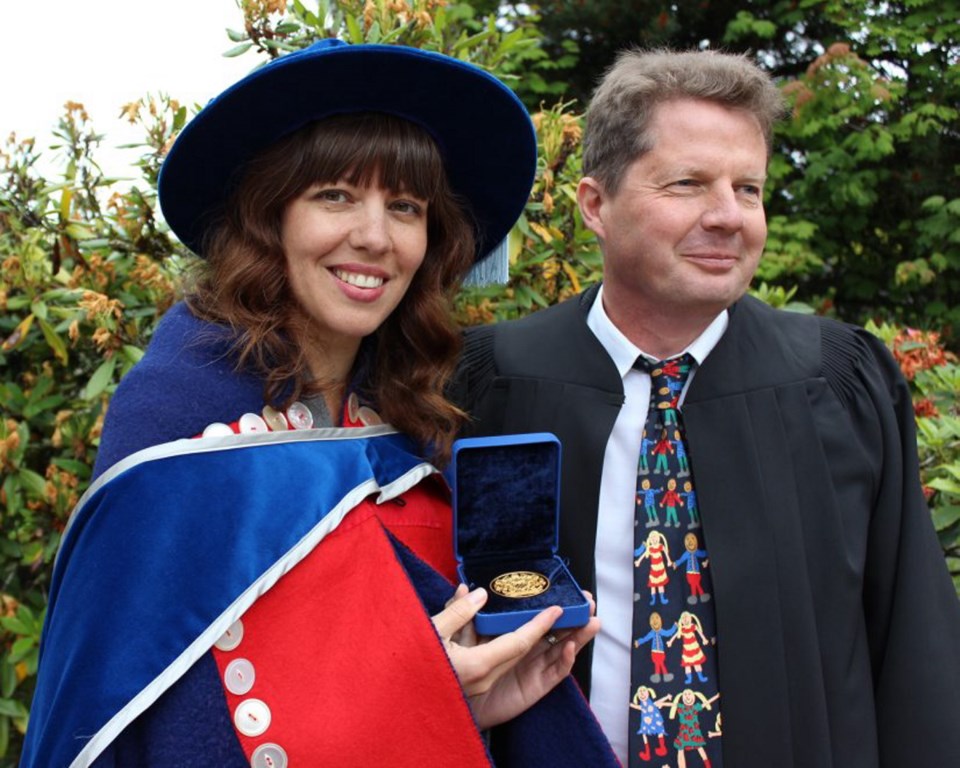Sarah Hunt was a precocious force when she started her studies at the University of Victoria at the age of 17.
At that time, the mid-1990s, many First Nations students struggled to make it through high school. Hunt, of Kwagiulth, Ukrainian and English heritage, was a Spectrum Community School graduate and co-valedictorian of the city’s native grad class. She had been a Miss Native Friendship Centre princess and was active in the Songhees community where she lived.
But it was the suicide of her cousin, Malidi, who was close to her age, and the questions around her death that in part led Hunt to become an advocate and academic.
“It was a pivotal time for me. She was loved and deeply connected to her culture,” said Hunt, 37. “But I started to think about the silences around her story, around intergenerational abuse. And I saw it as my obligation to look at that.”
Hunt embarked on a social-justice and scholastic journey that culminated in a prestigious award last week. She received a Governor General’s gold medal with her doctorate in geography from Simon Fraser University — an honour given to the top two PhD graduates.
Her thesis investigated “the dynamics of law, violence and space through the frequently unheard perspectives of indigenous people working to address violence in communities across sa���ʴ�ý”
In it, she explored the healing and empowering possibilities of restoring indigenous justice models.
Hunt’s supervisor, Nicholas Blomley, described her as “a truly engaged — in the fullest and most important meaning of the term — and brilliant young woman connecting to the communities in which she has been doing meaningful and extraordinarily challenging work.”
Corinne Michel was a First Nations education high school teacher when she first met Hunt, who was a student.
“Even then, she was a mover and a shaker,” said Michel, who now co-ordinates aboriginal programs at Camosun College. She said Hunt has helped paved the way for First Nations students and heralded her advocacy of indigenous research methods. “I can’t even put into words how proud I am of her and the role model she’s become.”
Hunt isn’t much for talking about her accolades, but recognizes the importance of indigenous role models in higher education.
“I had no idea this could even be a career,” she said. “But I had so many people who believed in me along the way and encouraged me to move forward.”
When Hunt first went to the University of Victoria, she said, there were about 50 aboriginal students and one professor. There was a small First Nations Students’ Union. Hunt co-hosted an indigenous radio program on CFUV called UnReserved, where she played Buffy Sainte-Marie music and read poetry. She realized she had never read anything by an aboriginal author.
“That’s changed incredibly in 20 years,” she said. “Indigenous education is now an issue and a priority. You can really see that.”
This month, UVic awarded degrees to 87 aboriginal students, 20 of whom received post-graduate degrees.
During her first years of Women’s Studies, Hunt developed a drive to confront violence against First Nations women.
She became an outreach worker with the Urban Native Youth Association in Vancouver. It was the time when missing and murdered women from the Downtown Eastside and Highway of Tears in northern sa���ʴ�ý were coming to light. She found out her close friend’s mother was one of Willie Pickton’s first victims. Elsie Sebastian was 42 when she disappeared in 1991. Her body was never found.
Hunt became a researcher and educator, developing community-based resources to help address violence. Speaking to First Nations people in their own communities, she saw a need to include more indigenous voices in scholarship.
“A lot of violence prevention doesn’t look at residential school abuse or the effect of living in a smaller community,” Hunt said.
She returned to UVic in 2007 to work on an interdisciplinary master’s degree and became a principal investigator with the LE’NONET research project, which aimed to increase retention and graduation rates among aboriginal students.
“One of the main findings was building relationships — a sense of connectedness to the community — helped increase success,” said Hunt, who has been nominated for a sa���ʴ�ý Research Chair at a sa���ʴ�ý university. The successful candidate will be announced in the fall.
She hopes her work and story inspire teachers, as well as aboriginal students, to pursue education.
“Some teachers might assume their native students are not capable or not interested. But that’s where change starts, one teacher or neighbour at a time. That one person who believed they could make a difference.”



